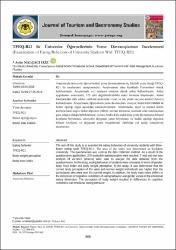| dc.contributor.author | İkiz, Aylin Nalçacı | |
| dc.date.accessioned | 2021-01-14T18:16:46Z | |
| dc.date.available | 2021-01-14T18:16:46Z | |
| dc.date.issued | 2019 | |
| dc.identifier.citation | İkiz A. N. (2019). TFEQ-R21 ile Üniversite Öğrencilerinin Yeme Davranışlarının İncelenmesi. Journal of Tourism and Gastronomy Studies, 7(2), 968 – 979. | en_US |
| dc.identifier.issn | 2147-8775 | |
| dc.identifier.uri | https://doi.org/10.21325/jotags.2019.402 | |
| dc.identifier.uri | https://app.trdizin.gov.tr/makale/TXpRek16VXlNZz09 | |
| dc.identifier.uri | https://hdl.handle.net/20.500.12587/13338 | |
| dc.description.abstract | Araştırmada üniversite öğrencilerinin yeme davranışlarının üç faktörlü yeme ölçeği TFEQR21 ile incelenmesi amaçlanmıştır. Araştırmanın alanı Kırıkkale Üniversitesi olarak belirlenmiştir. Araştırmada veri toplama yöntemi olarak anket kullanılmıştır. Anket uygulaması sonucunda, 375 adet değerlendirilebilir anket formuna ulaşılmıştır. Anket formlarından elde edilen verilerin analizinde t-testi ve tek yönlü varyans analizi (Anova) kullanılmıştır. Araştırmada, öğrencilerin yeme davranışları, cinsiyet, beden kitle indeksi ve beden ağırlığı algısı açısından karşılaştırılmıştır. Araştırmada, zayıf ve normal kilolu katılımcıların doğru beden algısının (DBA), normal kilolunun üzerinde olan katılımcılara göre yüksek olduğu belirlenmiştir. Ayrıca, beden kitle indeksinin yeme davranışının bilişsel kısıtlama boyutunda, cinsiyetin duygusal yeme boyutunda ve beden ağırlığı algısının bilişsel kısıtlama ve duygusal yeme boyutlarında farklılığa yol açtığı sonuçlarına ulaşılmıştır. | en_US |
| dc.description.abstract | The aim of this study is to examine the eating behaviors of university students with threefactor eating scale TFEQ-R21. The area of the study was determined as Kırıkkale University. The questionnaire was used as the data collection method. As a result of the questionnaire application, 375 evaluable questionnaires were reached. T-test and one-way analysis of variance (Anova) were used to analyze the data obtained from the questionnaires. In the study, eating behaviors of students were compared in terms of gender, body mass index and body weight perception. In the study, it was determined that the correct body perception of the weak and normal weight individuals was higher than the participants who were over the normal weight. In addition, the body mass index differs in the dimension of cognitive restriction of eating behavior and gender varies in the emotional eating dimension. The perception of body weight resulted in differences in cognitive restriction and emotional eating behavior. | en_US |
| dc.language.iso | tur | en_US |
| dc.relation.isversionof | 10.21325/jotags.2019.402 | en_US |
| dc.rights | info:eu-repo/semantics/openAccess | en_US |
| dc.title | TFEQ-R21 ile Üniversite Öğrencilerinin Yeme Davranışlarının İncelenmesi | en_US |
| dc.title.alternative | Examination of Eating Behaviors of University Students With TFEQ-R21 | en_US |
| dc.type | article | en_US |
| dc.identifier.volume | 7 | en_US |
| dc.identifier.issue | 2 | en_US |
| dc.identifier.startpage | 968 | en_US |
| dc.identifier.endpage | 979 | en_US |
| dc.relation.journal | Journal of Tourism and Gastronomy Studies | en_US |
| dc.relation.publicationcategory | Makale - Ulusal Hakemli Dergi - Kurum Öğretim Elemanı | en_US |
















